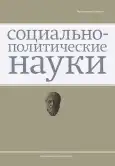State and Non-profit Sector Relations: The Formation of Unique Russian Model
- Autores: Salavatov I.K.1
-
Afiliações:
- Moscow State Institute of International Relations (MGIMO University) under the umbrella of the Russian Federation Ministry of Foreign Affairs
- Edição: Volume 13, Nº 3 (2023)
- Páginas: 81-87
- Seção: Socio-economic research
- URL: https://bakhtiniada.ru/2223-0092/article/view/145552
- DOI: https://doi.org/10.33693/2223-0092-2023-13-3-81-87
- EDN: https://elibrary.ru/HXUHLX
- ID: 145552
Citar
Resumo
The research studies the relations between the state and non-profit sector.
The article aims to analyze the prevalent models of interaction and to describe the emerging Russian model. Based on the system approach the existing models are classified according to the established practices into Western, Chinese and dependent models. The study reveals particular Russian experience and claims that it can be regarded as a new emerging model. The paper emphasized the need for coordinated effort from the Russian government and civil society in order to maintain efficient development of this model. Therefore it can be used for policymaking in relation to NGOs and may serve as a basis for further research to provide recommendations to boost the efficiency of interactions.
Palavras-chave
Texto integral
##article.viewOnOriginalSite##Sobre autores
Ilyas Salavatov
Moscow State Institute of International Relations (MGIMO University) under the umbrella of the Russian Federation Ministry of Foreign Affairs
Autor responsável pela correspondência
Email: il.salavatov@my.mgimo.ru
master degree, Department of Political Theory
Rússia, MoscowBibliografia
- Brinkerhoff J.M. A model and typology of government-NGO relationships // Nonprofit and Voluntary Sector Quarterly. 1998. No. 27 (3). Pp. 358–382.
- Cohen G.A. Theoretical perspectives on state-NGO relations // The Brookings Institution. 2004. URL: https://www.brookings.edu/wp-content/uploads/2016/06/Cohen20040120.pdf
- Farid M., Li H. Reciprocal engagement and NGO policy influence on the local state in China. Voluntas // International Journal of Voluntary and Nonprofit Organizations. 2020. No. 31 (6). Pp. 1386–1399.
- Hasmath R., Hsu J.Y.J. Isomorphic pressures, epistemic communities and state-NGO collaboration in China // The China Quarterly. 2014. No. 220. Pp. 936–954.
- Holmes G. Conservation’s friends in high places: Neoliberalism, networks, and the transnational conservation elite // Global Environmental Politics. 2011. No. 11 (4). Pp. 1–21. ISSN: 1526-3800.
- Mok K.H., Chan C.K., Wen Z. State-NGOs relationship in the context of China contracting out social services // Social Policy & Administration. 2020. Pp. 1–15.
- Olson L. Fighting for humanitarian space: NGOs in Afghanistan // Journal of Military and Strategic Studies. 2006. Vol. 9. Issue 1.
- Salamon L.M. Of market failure, voluntary failure, and third-party government: Toward a theory of government-nonprofit relations in the modern welfare state // Nonprofit and Voluntary Sector Quarterly. 1987. No. 16 (1–2). Pp. 29–49. doi: 10.1177/089976408701600104
- Sofe A.A. Assessment of corruption in the humanitarian assistance in Puntland State of Somali // Journal of Financial Crime. 2020. Vol. 27. No. 1. Pp. 104–118.
- Thrandardottir E. NGO legitimacy: Four models // Representation. 2015. No. 51:1. Pp. 107–123.
- United States Congress. Foreign Agents Registration Act, 1938 (22 USC § 611 et seq.).
- Bobrova O.V., Podberezkin A.I., Podberezkina O.A. Non-state development institutions – power tools of politics. Observer. 2021. No. 9 (380). Pp. 5–33. (In Rus.)
- Charity law of the people’s Republic of China (Order No. 43 of the President of the PRC). National People’s Congress of the People’s Republic of China. 01.09.2016. URL: http://www.npc.gov.cn/englishnpc/Law/2016-09/01/content_1991814.htm (data of accesses: 30.03.2023).
- The law on administration of activities of overseas nongovernmental organizations in Mainland China. National People’s Congress of the People’s Republic of China. 28.04.2016. URL: http://www.npc.gov.cn/englishnpc/Law/2016-05/04/content_1974064.htm (data of accesses: 30.03.2023).
- Kosygina K.E. Employment of the population in non-profit sector organizations: Russian and foreign experience. Bulletin of the NGIEI. 2021. No. 1 (116). Pp. 64–76. (In Rus.)
- Mikhailova V.V. The main characteristics of the interaction of NGOs and the state in the Nizhny Novgorod region. Sociology and social work. Bulletin of the Nizhny Novgorod University named after N.I. Lobachevsky. 2007. No. 1 (6). Pp. 70–74. (In Rus.)
- Nezdyurov A.L., Sungurov A.Yu. Interaction of authorities and civil society structures: possible models and their implementation in the socio-political life of modern Russia. In: Factors of civil society development and mechanisms of its interaction with the state. L.I. Yakobson (ed.). Moscow: Vershina, 2008. Pp. 209–214.
- Nosanenko G.Y. Models of interaction between the “third sector” and the authorities (based on empirical research). ANI: Economics and Management. 2017. Vol. 6. No. 1 (18). (In Rus.)
- On the control of the activities of persons under foreign influence: Federal Law No. 255-FZ of July 14, 2022. Rossiyskaya Gazeta. 2022. No. 154(8802). (In Rus.)
- Pasler O.V. Civil society and the state: The Russian model of interaction: Dis. ... Cand. Sci. (Polit.) (23.00.02). Stavropol, 2011. 214 p.
- Romodina A.M., Cherepanova L.B. Interaction of NGOs and the state in the provision of social services in the Russian Federation. Management in Modern Systems. 2022. No. 4. Pp. 22–33. (In Rus.)
Arquivos suplementares








